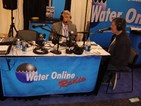WEF Charts A Course For The Future

Jeff Eger, executive director for the Water Environment Federation (WEF), talks about the strategic direction of his organization, the trends he’s witnessing for this year, and how to overcome challenges in the water/wastewater industry.
Here’s an excerpt from Water Online Radio’s Q&A with Eger:
Water Online Radio: Jeff, if anybody has their finger on the pulse of the major issues facing the water sector today, I think it would be you. Give us a little insight into what’s on your mind.
Jeff Eger Let’s face it. In some areas of our country they have too much water. Some areas, they don’t have enough of it. And so that just creates some tremendous challenges when you look nationally or, really, globally because it’s the same kind of issue.
You have these issues of drought, which is then forcing us to be industrious and look at things differently. There was an article in the New York Times that said, “Let’s not waste a good drought.” And the thought there was let’s start really embracing water reuse.
The issue of too much water is related to the managing of stormwater and the advent of green infrastructure and being much more creative. The problem is on both sides.
Then, of course, overarching is money. And it’s a serious issue right now that it has dried up.
Water Online Radio: Why is innovation particularly important in the water sector?
Jeff Eger: I think we’re on the brink right now of the next evolution of how to treat water and how to deal with water. The technology is there. I think sometimes we’re a risk-averse industry. We’re kind of afraid of taking that chance because it’s unproven. But it is what’s going to make us get into this next decade ahead.
Producing power – the fact that one of the largest cost items for a wastewater treatment plant is energy, and yet we now know that wastewater treatment plants can create energy to operate their facilities and sell it back to the grid. The possibilities are there.
Then what happens, when the public sees that we’re no longer a waste industry, but a resource production industry, I think they’ll get the link. I think they’ll be more open to make the investment to pay the rates that we need.
Click on the Radio Player above to hear the full interview.
